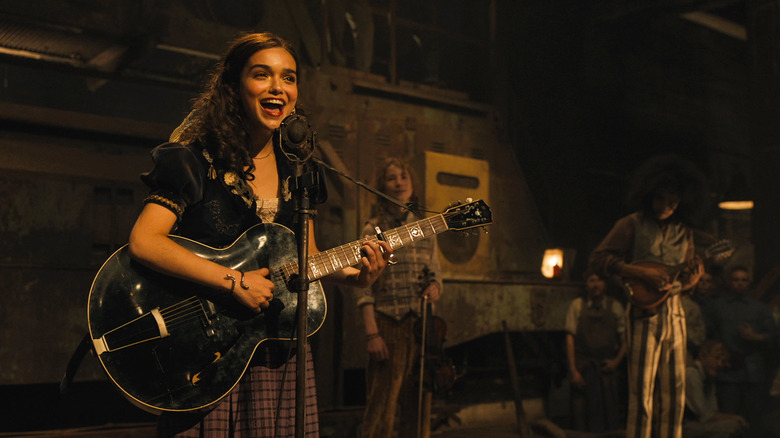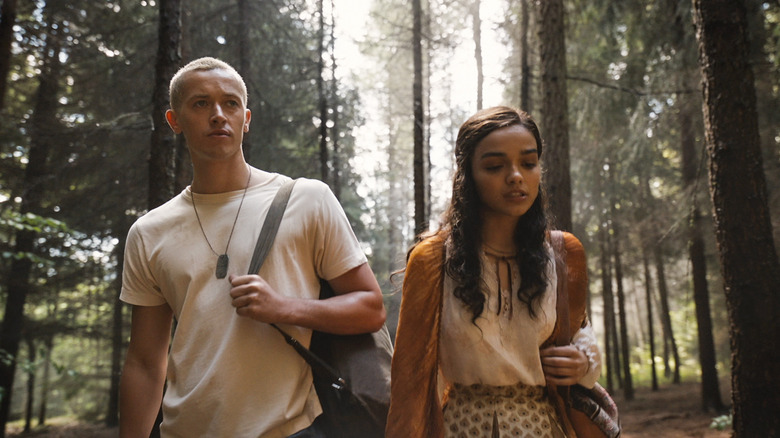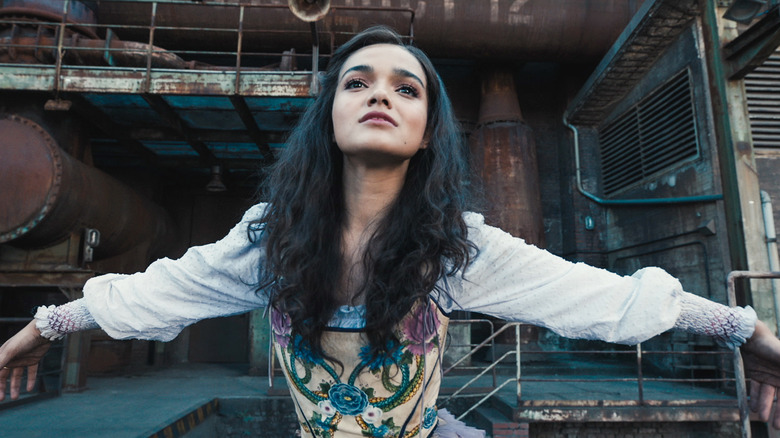The Ballad Of Songbirds & Snakes Unlocks The Secret Meaning Of 'The Hanging Tree'
This article contains spoilers for "The Hunger Games: The Ballad of Songbirds & Snakes."
Lucy Gray Baird, co-lead of "The Hunger Games: The Ballad of Songbirds & Snakes," is a folk singer in the impoverished District 12 of fascist dystopia Panem. Chosen to fight in the titular death match, she wins over the Capitol of Panem with her voice, guitar, and songwriting. It's clear this is one reason why accomplished singer Rachel Zegler was chosen for the part; before Zegler was a movie star, she was belting out "Shallow" from "A Star Is Born" to her adoring YouTube subscribers.
Now, she sings Lucy's songs on the silver screen (recorded live on set, I should add). The highlight of her discography is the lively and defiant shindig song "Nothing You Can Take From Me."
Music has been important in "The Hunger Games" even before this prequel. In particular, the song "The Hanging Tree" from the original two-part trilogy finale "Mockingjay." Sung by hero Katniss Everdeen (Jennifer Lawrence), the song goes like this:
"Are you, are you, coming to the tree?
Where they strung up a man, they say murdered three.
Strange things did happen here, no stranger would it be,
If we met, up at midnight, in the hanging tree."
The song carries on for three more verses; lines #1, 3, and 4 repeat while #2 is continually swapped out, telling the story of the hung man warning his lover to run away.
"The Ballad of Songbirds & Snakes" reveals the origin of this song — Lucy wrote it herself — and the events that inspired it.
Snow stained with blood
The first two-thirds of "Ballad" focuses on Lucy competing in the 10th annual Hunger Games, mentored by a young Coriolanus Snow (Tom Blyth), future president of Panem and villain of the original trilogy. The smitten Snow cheats to help Lucy live, so he's banished to District 12 to serve in the "Peacekeeper" police.
In District 12, the Peacekeepers execute dissidents by hanging them from a tall, barren tree. With Snow standing guard and Lucy in the crowd, miner Arlo Chance is executed for supposedly having killed three men. His lover calls out that he's innocent and is arrested by the Peacekeepers. Arlo's warning to her is echoed by Jabberjays flying overhead, giving double meaning to this line from the second verse: "Where the dead man called out for his love to flee."
When Lucy and Snow next meet, she's singing the newly-written "The Hanging Tree," evidently inspired by the execution she witnessed.
The story of the song winds up mirroring this doomed love story. As in the third verse ("Where I told you to run, so we'd both be free"), Snow and Lucy plan to run away together, meeting up by the hanging tree at dawn. Then Lucy learns Snow is a man who murdered three and so flees; the Mockingjays in the treetops echo her singing "The Hanging Tree," taunting Snow like a ghost.
A Mockingjay's song
Lucy's fate is a mystery, but her song lives on in Katniss. In "Mockingjay," she sings "The Hanging Tree" on camera and turns it into a rallying cry for the revolting Districts. Propaganda master Plutarch Heavensbee (Philip Seymour Hoffman) even changes the fourth verse's second line ("Wear a necklace of rope, side by side with me" is adjusted with "Necklace of hope") to reflect the song's new purpose. Rebels in District 5 sing "The Hanging Tree" in unison while marching on and then destroying a hydroelectric dam. That Lucy's song helps bring down Snow's regime adds karmic bitterness to his defeat.
Suzanne Collins' original "Mockingjay" book offers even more background on the song. For instance, it's banned in District 12 by the Peacekeepers, so it becoming an anthem of defiance has another layer. Katniss learned it from her late father; she never discovers the song's origin but does realize its meaning (the hung man is asking his lover to join him in death, like how she's asking Panem's impoverished to join her in risking their lives).
Both Lawrence's and Zegler's versions of "The Hanging Tree" have been officially released as part of the "Hunger Games" soundtrack. Lawrence appropriately sings like she's leading a chant (it eventually evolves into a choir song), while Zegler's cover sounds more like a lullaby; it's sung a bit slower and with audible guitar strumming.
Abraham's Daughter
Like I said before, music is an important piece of the "Hunger Games" puzzle. My favorite song on the series' soundtrack is a non-diegetic one; "Abraham's Daughter" by Arcade Fire, the closing credits theme of the original 2012 "Hunger Games" film. Instrumentally, it's composed like a rock song, but the lyrics are infused with the spirit of folk music and tell a thematically resonant story like "The Hanging Tree."
The song, with only three verses, alludes to the Biblical story of Abraham and Isaac. God commands Abraham to kill his son Isaac to prove his faith. Abraham obliges, but an Angel stays his hand at the last second — just his being willing to make the sacrifice satisfies God, no pound of flesh needed.
This is, in essence, the same demand of the Hunger Games; the Capitol takes the children of the Districts as blood tributes to remind their subjects of their fealty. However, in "Abraham's Daughter," a fourth player shakes things up.
Read the lyrics below:
"Abraham took Isaac's hand
And led him to the lonesome hill
While his daughter hid and watched
She dare not breathe, she was so still
Just as an angel cried for the slaughter
Abraham's daughter raised her voice"
"Then the angel asked her what her name was
She said, I have none
Then he asked, how can this be
My father never gave me one"
"And when he saw her, raised for the slaughter
Abraham's daughter raised her bow
How darest you, child, defy your father
You'd better let young Isaac go."
Notice the weapon of Abraham's daughter — a bow, or Katniss' signature weapon. The song's ending refers to her standing in defiance of the supreme authority that is the Capitol.
"The Hunger Games: The Ballad of Songbirds & Snakes" is currently playing in theaters.



